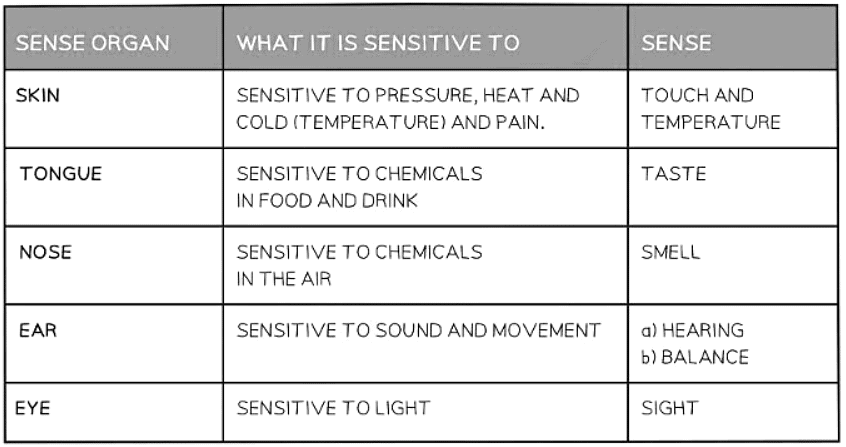Class 10 Exam > Class 10 Notes > Biology for GCSE/IGCSE > Sense Organs
Sense Organs | Biology for GCSE/IGCSE - Class 10 PDF Download
Sense Organs as Receptors
- Receptors consist of specialized cells that identify changes in the environment.
- When stimulated, they generate electrical impulses.
- Sense organs house receptor groups, each responding to specific stimuli.

- Once activated, receptor cells produce electrical impulses.
- These impulses travel through sensory neurons to the central nervous system.
- Decision-making and response occur in the central nervous system, forwarding impulses through motor neurons.
- Motor neurons transmit impulses to effectors, such as muscles or glands.
- Effectors execute the response.
Sense Organs
- The Eye
- The eye is a complex organ responsible for vision.
- It consists of various parts such as the cornea, iris, lens, and retina.
- Light enters through the cornea and is focused by the lens onto the retina.
- The retina contains photoreceptor cells called rods and cones.
- The Ear
- The ear is involved in both hearing and balance.
- It consists of the outer ear, middle ear, and inner ear.
- Sound waves are collected by the outer ear and transmitted through the middle ear to the inner ear.
- The inner ear contains the cochlea, which is responsible for converting sound vibrations into electrical signals.
- The Nose
- The nose is responsible for the sense of smell.
- It contains olfactory receptors that detect odors in the environment.
- When you smell something, molecules in the air stimulate these receptors, sending signals to the brain.
- The Tongue
- The tongue is essential for the sense of taste.
- It contains taste buds that can detect sweet, sour, bitter, salty, and umami flavors.
- These taste buds send signals to the brain, allowing us to perceive different tastes.
Question for Sense OrgansTry yourself: Which sense organ is responsible for the sense of taste?View Solution
The document Sense Organs | Biology for GCSE/IGCSE - Class 10 is a part of the Class 10 Course Biology for GCSE/IGCSE.
All you need of Class 10 at this link: Class 10
|
101 videos|193 docs|33 tests
|
Related Searches




















